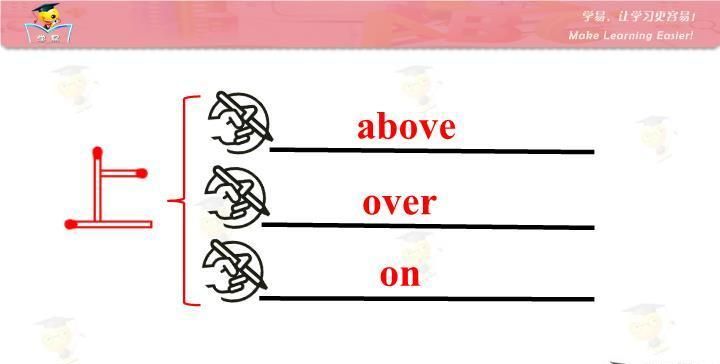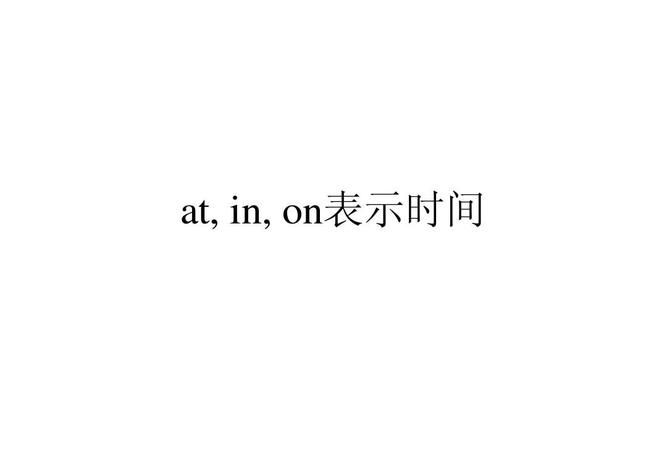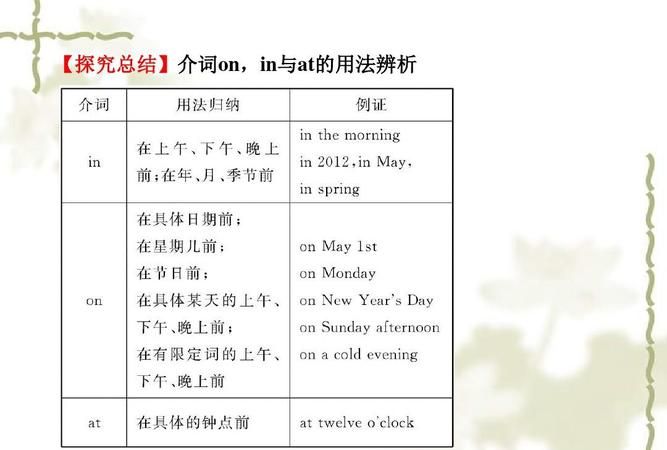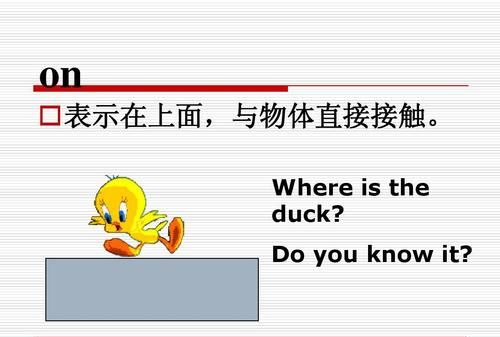本文目录
介词on的用法
介词on表示时间、地点、方位等.
(1)on表示时间,用于星期、日期(包括该天的各部分).如:on Sunday/Sundays,on Monday morning/afternoon/evening等.
on也用于某一日的名词前,用于公共节假日前.如:
On New Year's Day 在元旦,on Children's Day 在儿童节等.
(2)on表示地点、位置,有"在.旁"、"接近"、"靠近"之意.如:
a house on the main road 临大街的房子,sit on my right 坐在我的右边
(3)on表示状态,译为"处于.情况中,从事于."等.如:
on duty 值日,on holiday 度假
(4)on表示"在.上面",用在表示物体的名词前.如:
on the box 在盒子上
on和over都是介词,on表示"在.上面",指一物体与另一物体表面相接触;over表示"在.上方",指一物体与另一物体不接触.试比较:
There is a light on the desk.桌子上有盏台灯.(light与desk接触)
There is a light over the desk.桌子上方有一盏灯.(light与desk不接触)
表示"在.上",介词on与in必须注意习惯用法,否则会出错.不妨比较一番:
on the tree/in the tree都译为".在树上".前者表示树上本身所长着的叶子、花、果实等;后者表示某物或某人在树上.
on the wall/in the wall都译为"在墙上".由于介词不同,在使用上有区别.图画、黑板、风筝等"在墙上",是因为它们在墙的表面上,故用on the wall;门窗、钉子、洞、孔等"在墙上",是因为它们在墙的里面,故用in the wall.
有疑问在线交谈 祝你新年快乐 天天开心 心想事成 ...

初中英语介词to的常见用法
介词在英语考试中是必考知识点,同时也是同学们掌握最弱、最易出错的知识点。下面是我整理的内容,供大家参考。
初中英语介词on的常见用法总结
1.动词+on
a)动词+ on要认真区分下面一些词组
act on对…有作用, bring on促使;导致, call on拜访某人,count on依赖, carry on执行
depend on取决, feed on以…为生,figure on料想;推断, go on继续,have on穿着, insist on坚持
keep on继续, lean on依赖, live on以…为生, pull on迅速穿上,put on穿上, switch on接通(电源)
take to喜欢;养成;轻易学会,turn on接通(电源), work on操作, wait on侍候。
b)动词+sb.(sth.)+ on +sb.(sth.)
base on以…为基础, congratulate on恭贺, fix on固定, have mercy on怜悯,have pity on怜惜,
keep watch on监视, spend on把时间、精力花在某方面。
2.be+形容词+on的词组
be dependent on依赖, be hard on对某人苛刻,be impressed on对…印象深刻, be keen on渴望,
be strict on对…严格。
3.on+名词构成的词组
on board乘(车,飞机),on call听候召唤, on duty值班, on earth到底, on fire着火, on foot步行
on guard在岗,on hire雇用,on holiday度假
英语其他介词还有什用法
1.on,about
on, about都表示“关于”,但用法不同。on侧重于指比较重大或深奥的理论、学术等为恩替;about侧重于与人或事物有关的事迹或情况。
例:I have a book about fishing.
2.except,except for,besides
except, except for, besides都表示“除了”,但用法不同。except表示“除了......之外(其他的都......)”,其后的宾语被排除在整体之外;besides表示“除了......之外(其他的也......),其后的宾语被包括在整体里;except for表示“除了......之外”,它强调的是先肯定整体,然后从中排除一小部分,对整体内容起到修正作用。
例:Besides milk, we need some orange juice.He loves his job except for the long hours.
3.between,among
between一般指两者之间;among一般指三者或三者以上之间。
例:He arrived between 9 and 10 last night.
4.of
of可以表示所属关系,也可以表示部分、范围等。
例:Here are two nice photos of my family.
5.like
like表示“像”。
例:Her hair is dark brown like mine.
6.with
with可以表示“和......一起”,也可以表示“带有”,还可以表示行为方式等。
例:She came back with a letter in her hand.
7.without
without表示“没有,无”。
例:He found the place without difficulty.
8.for
for可以表示目的,也可以表示原因。
例:I look after the kids for them.
9.as
as可以表示“像、按照”,也可以表示“作为”。
例:You ought to do as the teacher tells you.
10.against
against表示“反对”。
例:There are 10 votes for him and only 2 against him.

in和on的意思分别是什么
1.on,in,at表示时间
on“在具体某一天”①
“当某时”,动名词,arrival,death前;early,late位句先②,用in一般“上”“下”“晚”;on用于天,in用于月、季、年③;限定三时in要变.④at是个时间点,“工作”“时刻”与“圣诞”⑤.at noon(night),in the day,习惯用语记心间.
注:①on表示在具体某一天及具体某一天的上午、下午和晚上.
例 On mother's Day,we should send flowers to our mother.母亲节,我们应该送花给我们的母亲.
On my arrival home,I found he had gone already.当我到家时,我发现他已经走了.
② 当early,late用于句首修饰介词短语时,尽管表示具体某一天的上午、下午、晚上,都要用in,泛指一般的上、下午,晚上也用in .
例 Early in the morning of National Day,I got up to catch the first bus to the zoo. 国庆节一清早,我便起床去赶到动物园的第一班公共汽车.
My father begins work at 8:00 in the morning and stops work at 4:00 in the afternoon. 我父亲上午8点上班,下午4点下班.
③于将来时态表示“过一段时间后” 及表示“在……期间” 和“在某个季节,某年、某月” 都用in.
例 I hear he’ll be back in a month.我听说他将于一个月后回来.
In the course of the last lesson in French,little Franz was listening to the master very attentively.在那最后一堂法语课中,小弗朗兹非常用心地听着老师讲.
Xiao Ming was born in December of 2004.小明生于2004年12月.
④当 morning,afternoon,evening有前位定语或后置定语限定时,就不用in而用on.
例 on a hot (summer) noon 在一个炎热(夏天)的中午
on Monday morning 在星期一上午
on the morning of March 8th在3月8日上午
⑤ 表示某时某刻及在work,Christmas前用at.
例 We get up at eight o’clock. 我们8点起床.
My father are busily at work all day. 我父亲整天忙于工作.
In western countries children get present from their parents at Christmas. 在西方国家,孩子们在圣诞节得到父亲给的礼物.
实际上是有关介词in和on的区别.介词in和on在表示方位的时候,在用法上有如下区别:
in表示在……中,在……内,例如:
in the village(在村里)
in the street(在街上)
in the fields(在田里)
in the woods(在树林里)
in the wall(在墙里面,例如在墙上打个钉)
on 表示在一个平面上,例如:
on the table(在桌上)
on the lake(在湖面上)
on the wall(在墙上,例如在墙的平面上挂幅画)
再比较:
We swim in the river.(我们在河里游泳)
We have a house on the river.(我们有座房子在河面上)
We swim in the river.(我们在河里游泳)
We have a house on the river.(我们有座房子在河面上)
【in】我是“大姐”,因为我后面所接的都是较长时间.具体用法有:
1. 表示在较长的时间里(如周/月份/季节/年份/世纪等).如:in a week; in May; in spring/summer/autumn/winter; in 2008; in the 1990’s等.
2. 表示在上午、下午或晚上.如:in the morning/afternoon/evening.
3. in the daytime(在白天) 属于固定搭配,指从日出到日落这一段时间,反义词组是in the night.
4. “in + 一段时间”表示“多久以后/以内”,常与将来时连用.如:in half an hour; in ten minutes; in a few days等.
【on】我是 “二姐”,我后面所接的时间多与日期有关.具体用法有:
1. 表示在具体的某一天(如日期、生日、节日或星期几).如:on May 4th,1919; on Monday; on Teachers’ Day; on my birthday; on that day等.
2. 表示某一天的上午、下午或晚上.如:on the morning of July 2; on Sunday afternoon; on a cold winter evening等.

on的用法归纳与in的区别
on基本意“在...上面”如:The ball is on the ground.球在地上。
on有什么用法
1、on表示“在…上”,强调在某事物表面。注意与in的区别,in强调在某事物内部。
The boy finished everything offonthe plate.男孩吃完了盘子上的所有东西。
There are bananasinthe fruit bowl.果盆里有香蕉。
2、选用介词on的场合,用于星期、日期(包括该天的各部分)前:on Sundays/weekdays、on Monday morning / afternoon / evening。
eg:I'm flying homeonSunday afternoon.我星期四下午乘飞机回家。
用于morning/afternoon/evening/night/day前,此时这类名词前多有修饰语或带有of等引起的后置修饰语,指具体的或不具体的某一日:on a cold afternoon、on the night of October 1, 1997。
on和in的区别是什么
in 英[ɪn] 美[ɪn]
prep. 采用(某种方式); 穿着,带着; (表示位置) 在…里面,(表示领域,范围)在…以内; (表示品质、能力等) 在…之中;
adv. 在家; 进入,到达; 流行; 当选;
adj. 在内的,朝内的; 在位的,执政的; [口语] 流行的,时髦的; (车等) 到站的;
[例句]He was in his car.
他坐在他的车里。
on 英[ɒn] 美[ɑ:n]
prep. (表示方向) 向; (表示对象) 对; (表示位置) 在…上; (表示时间) 在…之时;
adv. (放,穿,连接) 上; 向前,(继续)下去;
adj. 活动着的情况,状态; 使用着的; 发生着的; 计划中的;
[例句]He is sitting beside her on the sofa.
他挨着她坐在沙发上。
关于on的短语有哪些
a painting on the wall
墙上的一幅画
在...旁, 靠近
the inn on the road
路旁的旅店
the town on the river
临河的城镇
向着...
march on London
向伦敦前进
smile on sb.
对着某人笑
在...时候; ...之后立即
on the morning of May 5th
在五月五日早晨
on arriving home
刚到家就...
on analysis
经分析后
根据; 凭; 靠

以上就是关于on表示方式的用法 ,介词on的用法的全部内容,以及on表示方式的用法 的相关内容,希望能够帮到您。
